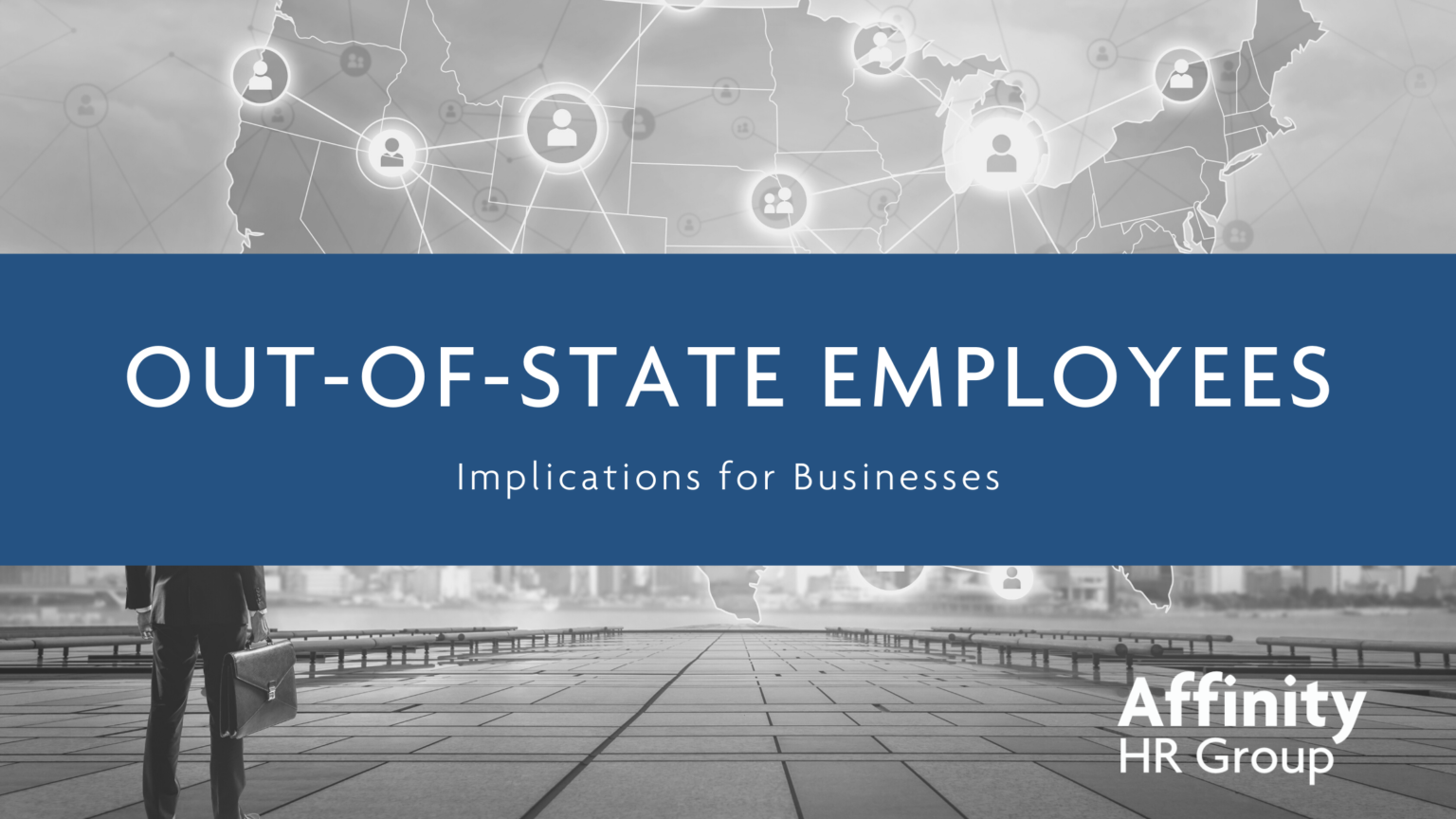Among the many changes to “business as usual” forced upon businesses during the COVID-19 pandemic is the reality of more employees working from home. Whether due to regulatory shutdowns or the requirement to self-quarantine or-isolate due to COVID-19 exposure or symptoms, many businesses have had to create solutions to allow employees to remote work in order to keep the business running. While numerous solutions were quickly implemented to react to the ever-changing pandemic, employees and employers are now realizing the longer-term implications of these remote work options. Employers are having to review and update normal employment procedures such as performance reviews and paid time off usage due to the new work-from-home reality.
However, employers who have employees who are temporarily working in a different state have even more implications to consider. Whether an employee usually commutes across state lines to come into the office or if they have had to temporarily relocate due to COVID-19 or financial considerations, employers need to follow employment laws in those states in addition to the state(s) in which the company is located. According to the American Institute of CPA’s, 47% of remote employees are unaware that laws vary by state and 70% did not know that working remotely may impact their tax filings.
In normal circumstances, an employer who hires an employee living and working in a different state has plenty of time to set up state-specific Workers’ Comp and unemployment insurance, file and pay state taxes, and learn the different employment laws. Given the emergency declarations and rapid decisions that had to be made during the pandemic, employers and employees are now realizing they have been subject to different laws this entire time.
Some states are making temporary exemptions for employees working remotely due to COVID-19 circumstances while others are requiring proper taxes be paid, Workers’ Comp and unemployment be maintained, and employment laws followed. Depending on where you and your employers are located, you may need to consider the following laws in the state(s) in which your employees are working to stay in compliance:
Employment laws: Every state has different employment laws. Any employer must follow the applicable employment laws of the state in which the employee works, even if they differ from the ones where the business is located. To further confuse what is applicable law, some state laws apply to all employees regardless of the number of employees in the state while others require a minimum number of employees working in that state to qualify. Here are some of the most common laws which differ state-to-state:
- Protected groups vary among all the states. While some groups are protected in every state because of federal law, other groups may be protected in a city, county, or state where an employee works while not being protected where the business is located. While no employee should be discriminated against for any reason, employees may have more protections and available courses of action in their remote work location which may increase your exposure to liability.
- Paid sick leave has become common in many states, counties, and cities. Many of these laws apply to any employee working in that location, regardless of if the business is located there. Having to offer leave to certain employees may impact overall paid time off policies.
- Paid family leave is currently or will soon be offered in 9 states (California, Colorado, Connecticut, Massachusetts, New Jersey, New York, Oregon, Rhode Island, and Washington) as well as in Washington, D.C. While many of these only cover employees of large businesses, some cover all employees and will apply to employees who may be working remotely in that state.
- Minimum wage varies widely among states, some being much higher than the federal $7.25 per hour. State law also varies regarding tip credit and minimum salary thresholds for exemptions.
- Overtime also differs in some states. While most follow the federal time-and-a-half for all hours worked over 40 in a workweek, some (including Alaska, California, Colorado, and Nevada) have more stringent overtime requirements.
- Posters and notices will be different state-to-state. While some do not need to be posted in an employee’s house if that is their workplace, others will need to be provided to employees in compliance with state law. Federal posters will also need to be made available to employees who are working remotely.
“Tax nexus” creation: In tax law, a “tax nexus” refers to a company’s presence in a state entitling the state to charge taxes and requiring the company to pay them. Typically, a business is considered active in a state if they have a physical location, resident employees working in the state, property in the state, and/or employees regularly soliciting business there (salespeople). Businesses meeting any of these criteria may be required to pay applicable taxes to that state.
Payroll tax requirements: Normally taxes must be paid in any state(s) in which the employee performs work (“physical presence”). Usually they would complete the state’s equivalent to a W-4 and state taxes are withheld from each paycheck. However, various exceptions may impact this. Some states (such as Pennsylvania and New Jersey) allow withholding tax reciprocity with neighboring states while others (such as Connecticut for employees working in New York City) offer an off-setting tax credit. Some states (such as Arizona) allow employees to work a limited number of days before having to pay taxes while others (such as New York) require employees to pay taxes if they work even one day in the state. The stay-at-home mandates issued throughout the pandemic add further complexities since employees and employers did not willingly create this work-across-state-lines situation.
Unemployment Insurance: In conjunction with other payroll taxes, employers need to have unemployment accounts established in each state in which an employee works so they can file properly if needed.
Workers’ Compensation: All states have their own Workers’ Compensation laws and systems. Businesses usually need to establish Workers’ Comp insurance accounts in each state in which they have employees working. If an employee is injured in a work-related accident while working from home, this will still be your responsibility, and the state will require proper coverage.
Work location permitting: Some local agencies require certain businesses to have permits for all locations where work is being done. If employees are regularly performing work from home, they may need to obtain business permits to keep you in compliance.
Given the wide variety of implications created by remote workers, we recommend consulting with your HR and accounting departments and/or advisors to ensure compliance. We also recommend checking with the zoning departments in the city and/or county where your employees are working to verify you are meeting all zoning and licensing requirements.
As always, please know Affinity HR Group is available to help you research the laws where you are as well as where your employees work. Our Affinity HR Support Plan is a great option for employers who need assistance navigating legislative changes where you do business.
By Paige McAllister, SPHR, SHRM-SCP, Vice President for Compliance – Affinity HR Group, Inc.






